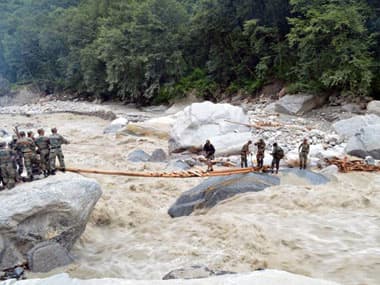When a person says something to someone, it doesn’t mean that he has successfully communicated his idea, opinion or suggestion to the other person. The process is complete only when the person communicated to, receives, assimilates and understands the message entirely. This is basic to life or else, it is equivalent to not having said anything at all. This tenet has to be understood by the Indian Meteorological Department which puts out its forecasts and measurements as routinely and unfailingly as the news bulletins. However, it is quite likely that a greater number of people who read those forecasts fail to grasp their meaning. To people like us, “heavy rain” rain could mean just that, some undefinable but inconvenient precipitation. The fact is though the met continuously informs us about weather conditions, more often than not, we fail to understand its inconvenience. Trying to understand the met department’s forecast is like trying to figure out what a doctor has scrawled on a prescription in illegible handwriting. [caption id=“attachment_916647” align=“alignleft” width=“380”]  Rescue operations at Uttarakhand. AFP.[/caption] While that doesn’t imply that the Uttarakhand government is not responsible for the tragedy, the bureaucrats might have well dismissed the met department’s ‘warnings’ because they made no sense to them. The met department claimed to have issued several warnings - of “heavy rain” on June 15 and “very heavy rains” on June 17. “Heavy” and “very heavy” does not sound ominous enough. That fact that the administration played down the warnings, as reported by The Times of India, confirms the fact that nobody except the met department officials themselves understood the gravity of the situation. TOI quotes the Chief Secretary, Subhash Kumar as saying: “These (alerts) happen (sic) every year, forecasting heavy rains. They say this every year but do not point out (to the likely) the intensity”. Uttarakhand Chief Minister, Vijay Bahuguna had said soon after the tragedy struck that it was a “Himalayan tsunami”, coining a new expression more expressive than the Met’s terminology. Devoid of jargon, he conveyed a lot more. Subodh Kumar couldn’t be more wrong. The ‘heavy rain” the Met was talking about is actually a precipitation of between 64.5 mm to 124.4 mm in 24 hours. The “very heavy” rain meant more than that but up to 224.4 mm. What happened in Uttarakhand was that it rained that much in a time span a lot less than 24 hours. Hence, the flood and the subsequent devastation occurred. Mumbai had seen 944 mm rainfall in 24 hours on July 25, 2005, much more than what Uttarkhand experienced. The nearly decade-old tragedy’s memory is still fresh in our memories, much like how Uttarakhand will be in times to come. Anything beyond 224.4 mm is “extremely heavy” rain, according to met terminology. There is another, “exceptionally heavy” rainfall, when the value of the day’s fall is near to what was recorded in a month or a season. So, clearly the met department’s jargon is of little help to a country like India which both looks forward to the monsoon and worries about its ferocity. Heavy rain can affect agriculture in our country and hence cause damage to our agrarian economy. What compounds the problem is the fact that not only does the met department not bother to issue coherent forecasts, it also doesn’t offer suggestions to the other government departments as to what they can do to brace for a natural catastrophe like what happened in Uttarakhand. It has never happened that the met has made an effort to effectively communicate the possibility of a natural calamity and the other departments have taken measures like planning rescue operations in advance. Had there been coordination between the departments, evacuations, providing relief and medical aid could have been done so much more efficiently. Here, a special advisory on June 15 warned that the Char Dham pilgrims should postpone their pilgrimage by four days, which in this case, would have meant much lower casualties but the other devastation may not have been avoided. The Met had also said on June 16 that pilgrims should “get back to safer places” because of “heavy rain” likely in the next day and-a-half. The glitch here is that the pilgrims, trekking and and travelling in cars or on mules and palanquins, would not have had access to these warnings. It was the administration’s responsibility to have stemmed the flow of the pilgrims into the evidently risky areas with limited facilities. This obligation was unmet. This failing amounts to criminal negligence. However, the Indian Meteorological Department may be well-advised to revise its output’s language and explain the terminology to the public and more importantly, sensitise the administrators across the country about the importance of their bulletins. For example, the _babu_s could start with reading this glossary available on the met’s website.
The meteorological department’s warnings were possibly ignored because they didn’t hint at the intensity of the disaster they were faced with.
Advertisement
End of Article
Written by Mahesh Vijapurkar
Mahesh Vijapurkar likes to take a worm’s eye-view of issues – that is, from the common man’s perspective. He was a journalist with The Indian Express and then The Hindu and now potters around with human development and urban issues. see more


)
)
)
)
)
)
)
)
)



